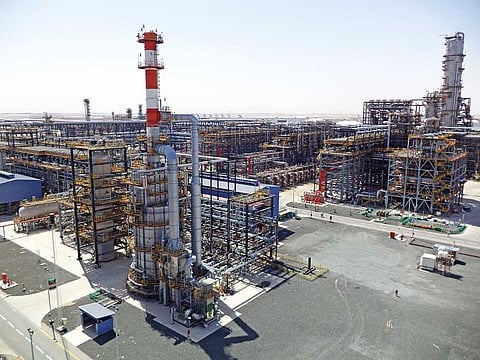Korean construction: Marching in lockstep with UAE’s miraculous development
UAE second biggest market for Korean construction

It is expected that the strengthening of close mutual cooperation with UAE partners will lead to the emergence of a ‘Korean wave’ in areas such as construction and infrastructure on the basis of the experience and trust Korean companies have accrued.
In March 2018, Korean President Moon Jae-in paid a visit to the UAE and agreed to form business ties between the two countries in the construction industry.
The UAE is now the second biggest market in the Middle East after Saudi Arabia for Korean construction with an accumulated contract value so far recorded of around US $80 billion.
“Korean construction has expertise and advanced know-how in the field of building, infrastructure and EPC contracts, especially in smart cities, airports and intelligent transport systems (ITS),” explained Sang-yub Lee, Managing Director of construction giant Ssangyong E&C.
His firm was the brand responsible for The Royal Atlantis Hotel and Residences in Dubai, as well as playing a role in the Wasl project in Dubai.
The Royal Atlantis Resort & Residences project involves the construction of three super-luxury hotel buildings and three residence towers with 170 pools and water features on the artificial Palm Jumeirah island.
“Seen from the sky, the entire structure is S-shaped, but seen from the front it resembles a complex stack of Lego blocks,’ said Sang-yub Lee.
“When the postponed Dubai Expo opens in 2021, this unique and irregular looking building complex will undoubtedly become a new global landmark representing Dubai.”
Meanwhile, the impressive ‘1 Residences’ by Wasl consists of two towers with a link bridge at the top. The project is in proximity to Za’abeel Park and Sheikh Zayed Road as well as being part of the master project, which includes other residential towers.
Another Korean construction firm making waves in the UAE is SK E&C, which is renowned for its plant business around the world. It has been more than ten years since SK E&C started its first projects in the UAE with Ruwais Refinery Expansion Package1 (2009) and Bab Gas Compression Stations (2009).
“SK E&C is continuously participating in new projects as the top business partner of customers at home and abroad based on an exceptional track record of quality, safety, low cost and high efficiency plant construction in the oil & gas industry,” said Sam Hwang, General Manager at SK E&C.
The company is currently pursuing business model innovation by venturing into fuel cell, eco-friendly and high value-added industrial plants through high level construction and project development capability. It is also starting to work on major projects in the infrastructure sector as well.
SK E&C was awarded the M Project (Oil Storage Cavern Project) in 2017 – an ongoing project that contains three oil storage units which can hold 42 million barrels in Fujairah. It will be the largest single oil storage cavern when it completes the construction.
Samsung Engineering is another prominent player that has contributed profoundly to the UAE’s growth, for not only in the construction industry, but moreover to UAE’s energy value chain. Since 2007, Samsung has executed 10 projects with $14 billion aggregated value, predominantly in Ruwais, UAE’s epicenter of integrated refinery and petrochemical complex.
The Carbon Black and Delayed Coker Project, which enables ADNOC to maximize ‘bottom-of-the-barrel’ heavy oils to produce more value added products and the Crude Flexibility Project, which once commissioned is expected to process the Upper Zakum grade crude, are both executed by Samsung.
ADNOC can further capitalize its offshore fields and ultimately diversify their feedstocks, which are the driving wheels for the downstream sector of ADNOC’s 2030 Strategy. Besides daily project execution, Samsung Engineering is extending partnerships with local manufactures and subcontractors and train Emiratis on its project sites in order to uphold the In-Country Value initiatives.
Above all, Samsung Engineering has been co-working with those partners via preemptively deploying Covid-19 self-test kits and masks in cooperation with UAE’s Ministry of Health to counter act towards the global pandemic.
In brief: Korean construction in the UAE
Korean firms started to make inroads into the UAE construction industry in 1974 when Shin Han Engineering and Construction Company entered the market. Shin Han specialised in overseas plant construction and branched out into various sectors such as petrochemistry, oil refining, and desalination.
In 1975, Dong-Ah Construction Company won a $16 million order from the Public Works Department for building the 480m, six-lane Mussafah bridge which connects the island of Abu Dhabi to the mainland. It was completed in 1978.
In the 1980s, construction orders from Middle East countries began to decline. Oil-producing companies could not make payments on time due to a decrease in oil imports.
However, since 2000 as oil prices continued to rise major oil-producing companies have been awarding orders in construction sectors with government finance – with many Korean companies reaping the benefit. Korean firms are now actively making inroads into the profitable plant industries. Up until 2000, the ratio of orders in civil engineering and construction to plant industry (based on the amount) was 7 to 3, but in 2007 the ratio turned into 2 to 8.
Korean construction firms have shown their capability to the Middle East industries by gaining technological competence through steady investment and having greater price competitiveness due to the depreciation of the Korean currency ‘won’ after the global financial crisis. From 2007 to 2009, Korean construction firms established a consortium with global companies, and they participated in large-scale projects.
Korean construction firms developed through trial and error in the process of managing EPC (Engineering, Procurement, Construction) projects and they now lead the way with impressive building technology accumulated from massive projects.



